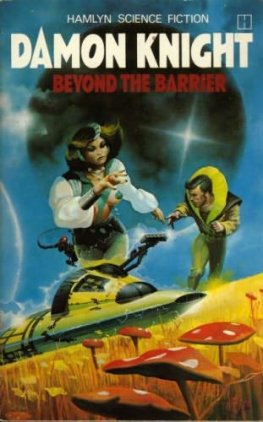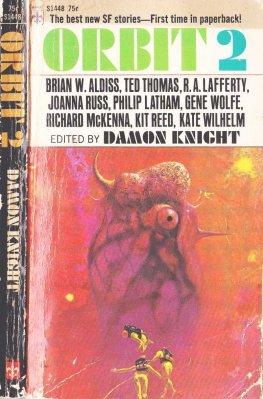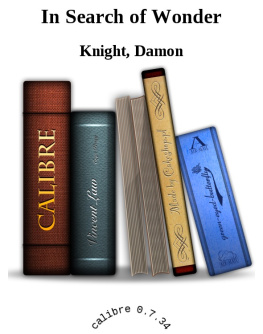Damon Knight - Orbit 17
Here you can read online Damon Knight - Orbit 17 full text of the book (entire story) in english for free. Download pdf and epub, get meaning, cover and reviews about this ebook. year: 1975, publisher: Harper & Row, genre: Science fiction. Description of the work, (preface) as well as reviews are available. Best literature library LitArk.com created for fans of good reading and offers a wide selection of genres:
Romance novel
Science fiction
Adventure
Detective
Science
History
Home and family
Prose
Art
Politics
Computer
Non-fiction
Religion
Business
Children
Humor
Choose a favorite category and find really read worthwhile books. Enjoy immersion in the world of imagination, feel the emotions of the characters or learn something new for yourself, make an fascinating discovery.

- Book:Orbit 17
- Author:
- Publisher:Harper & Row
- Genre:
- Year:1975
- ISBN:0-06-012434-2
- Rating:5 / 5
- Favourites:Add to favourites
- Your mark:
- 100
- 1
- 2
- 3
- 4
- 5
Orbit 17: summary, description and annotation
We offer to read an annotation, description, summary or preface (depends on what the author of the book "Orbit 17" wrote himself). If you haven't found the necessary information about the book — write in the comments, we will try to find it.
Orbit 17 — read online for free the complete book (whole text) full work
Below is the text of the book, divided by pages. System saving the place of the last page read, allows you to conveniently read the book "Orbit 17" online for free, without having to search again every time where you left off. Put a bookmark, and you can go to the page where you finished reading at any time.
Font size:
Interval:
Bookmark:
ORBIT 17
Edited by Damon Knight
HARPER & ROW, PUBLISHERS
New York, Evanston, San Francisco, London
Copyright 1975 by Damon Knight. All rights reserved. Printed in the United States of America. No part of this book may be used or reproduced in any manner whatsoever without written permission except in the case of brief quotations embodied in critical articles and reviews. For information address Harper & Row, Publishers, Inc., 10 East 53rd Street, New York, N.Y. 10022. Published simultaneously in Canada by Fitzhenry & Whiteside Limited, Toronto.
FIRST EDITION
isbn: 0-06-012434-2
LIBRARY OF CONGRESS CATALOG CARD NUMBER: 75-6371
Designed by C. Linda Dingier
Illustrations by Diehard Withelm
They Say
When do I work? Optimally, at nightstarting at midnight, and continuing until I have done my quota for that day, whereafter I read a little, eat something, listen to a little music and go to sleep, generally about sunrise. (My old friend, Cyril Korn-bluth, used to say, If God had meant man to be awake by day He wouldnt have given us the electric light.) This makes problems when I interface with the real world. Publishers and university people in particular have a foul habit of trying to telephone me in the morning, when I am generally asleep. But I wont change; from midnight to six there are no phone calls, the household is asleep, no one comes to the door and that is how I like it. I am all too easily distracted. Years ago I used to try to get my family to tell callers I was out in the morning. Now they just say I am asleep.
Being a writer is difficult; you not only need the talent and technique to write, you also need the discipline to make yourself do it, and the critical judgment to know when you are done. If you are a bricklayer, say, people tell you what to dotwelve courses of glazed yellow, ten yards long, staggered and faced with stone at the gate and when the wall is up you are through. If you are a writer you have to set yourself a task, make yourself do it, and evaluate the result when you are done, with little or no real help from anyone. To be sure people will try to tell you what you should do, and give you all the criticism you want, maybe more than you want, once it is irretrievably in print; but the only opinion that really matters is your own.
Frederik Pohl, in Hell's Cartographers (Weidenfeld & Nicolson, 1975)
Fairy tales are more concerned with situation than with character. They are the space fiction of the past.
Iona and Peter Opie,
The Classic Fairy Tales (Oxford University Press, 1974)
... But no amount of expert advice or money can make up for lack of imagination, as Harlan Ellison discovered when he tried to midwife a series called The Starlost, inspired by Heinleins Universe and various imitations thereof.
Ellison is usually the mortal enemy of hard science fiction, but he had enough integrity to want to do The Starlost justice. Nobody else did, however.
He had carefully worked up an outline based on the series heroes trying to locate the lost controls of the runaway starship they were onand not finding them until the last episode.
But before he knew it, the producers destroyed the integrity of the series by having the controls discovered in the second or third episode. Dont worry, they told Ellisonthey could keep up suspense with a search for the backup controls. On questioning them, he learned they thought backup controls were what would make the starship back up!
-John J. Pierce, in Reason, January 1975
Mr. Fiedler: Well, let me tell you an experience which I lived through. Not this time at the National Book Awards but the time before I was one of the fiction judges. There was a book I very much wanted the fiction judges to consider for the prize
Mr. Buckley: Are you at liberty to say which?
Mr. Fiedler: Yes, it was a book by a young science fiction writer called Norman Spinrad. Its called The Iron Dream. And the rest of my committee simply said, Thats science fiction. It doesnt enter into consideration as a novel. Someday well have a prize for science fiction. This is a kind of ghettoization of literature which is built into libraries even, right, public libraries. Childrens department, adult department. Real books, detective stories, westerns, science fiction, girls romances, whatever the distinctions are. And that also doesnt make much sense to me anymore.
Interview with Leslie Fiedler on Firing Line, December 1, 1974
The vast mass of humanity is, alas, attracted by nonsense. To point out that it is nonsense is merely to reassure people. They will roll in the dung heap all the more merrily for knowing that it is the real thing. The Roman philosopher Seneca said, Man is a reasoning animal. What evidence he had for that assertion no one knows; certainly none has surfaced in the 19 centuries since his time.
To be sure, a few individual human beings are reasoning animals. You can tell who they are by the fact that they are denounced by everyone else every time they open their mouths.
Isaac Asimov, in a letter to Time, January 20, 1975
THE ANTHROPOLOGIST
Kathleen M. Sidney
Home for Robert was a place he had never seendid it exist at all?

Where are you going? his sister asked.
Home.
He awoke, huddled among blue-grey bodies. For warmth? On a planet where no one was ever cold?
He woke up with a question. If nothing else, he was an anthropologist.
If nothing else.
Why are we huddled here? he asked them aloud. No one so much as opened an eye. They were used to him. They had always been used to him. From the first day he had stepped into their circle, one E-year ago, not one of them had shown the slightest spark of curiosity concerning him. Or anything else. Was nothing new to them? And nothing old? Half his time was up, and he knew no more about them now than when he began.
Gradually they woke up, stretching, an almost human gesture. And Robert spoke to them aloud, as a man lost in the wilderness for a year might speak to the trees. Pointless questions, to fill in the terrible quiet.
Where are you going? his sister asked.
Out to play.
They laughed at you.
Mommy said thats only because Im so different. Theyll get used to me.
And they laughed at him. He was too young to know that it was fear. If he was ridiculed, then he was ridiculous. And gradually they did grow used to him. He had learned the secret of success. He became their pet, a puppy dog who could talk and do tricks for them. If there is one thing stronger than the need for self-respect, it is loneliness. But he was spared one agony: he made a poor scapegoat. They could not easily project their fears about their own human weaknesses onto a beast with three heads and nine legs.
Mommy, where did I come from?
His mother was a biologist, a scientist, impatient with lies.
Remember how I told you about the planets and the suns? Yes.
Well, you came from another planet, called Epsilon Geminorum V. Its far away from here. Across the stars.
Robert pictured the stars, and the darkness between them.
Your parents gave you to Earth. Along with two others. I think so that we could raise you as our own children and come to understand them better through you.
I dont remember that.
You werent bom yet, really, you were inside an egg.
The laughers had told him he was hatched from an egg. He had thought they were making it up.
Was Susie hatched, too?
Font size:
Interval:
Bookmark:
Similar books «Orbit 17»
Look at similar books to Orbit 17. We have selected literature similar in name and meaning in the hope of providing readers with more options to find new, interesting, not yet read works.
Discussion, reviews of the book Orbit 17 and just readers' own opinions. Leave your comments, write what you think about the work, its meaning or the main characters. Specify what exactly you liked and what you didn't like, and why you think so.



